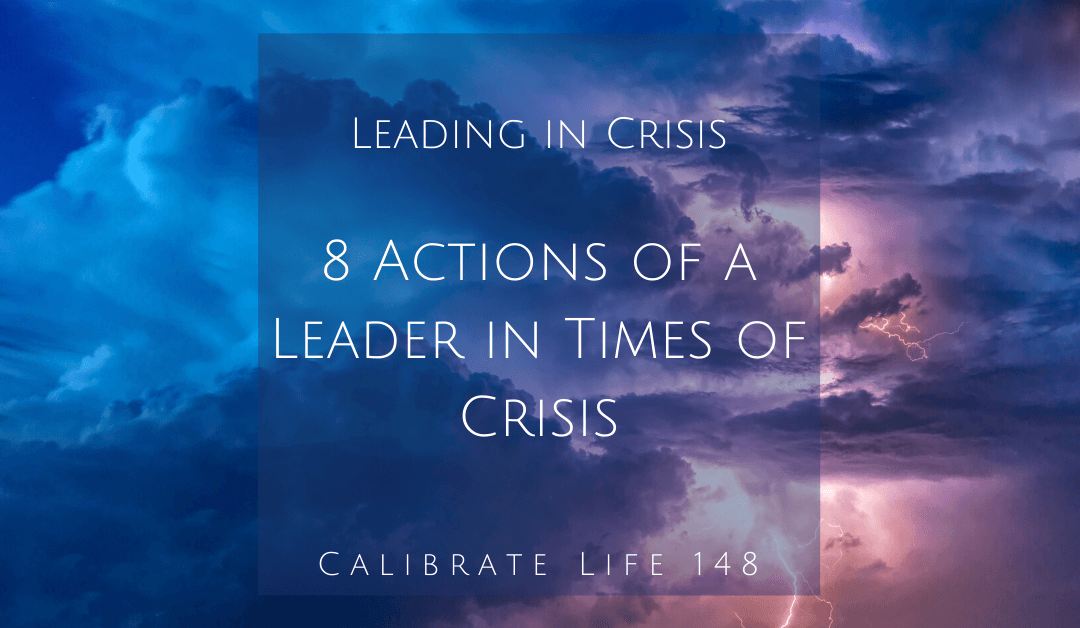Podcast: Play in new window | Download
Those we lead have the opportunity to see who we really are when we lead them in and through a crisis. Our heart, our character, our resolve, our faith, our love, and our motivations are all revealed. In episode 148 of The Calibrate Life Podcast, we discuss 8 things for a leader to keep in focus while leading during a crisis.
Listen or subscribe to the Calibrate Life Podcast in Apple Podcasts, in Google Podcasts, in Stitcher, or in any podcast player.
This episode is being recorded in April of 2020, at what we hope is the height of the Coronavirus/Covid-19 pandemic. Leadership is not business as usual. We are leading in a time when our nation is in crisis. Some are hurting badly, others are not as affected. Spiritual leaders are important in times of crisis.
Leadership is defined in crisis. our heart, our character, our resolve, our faith, our love, and our motivations are all revealed in times of crisis leadership. Those we lead have the opportunity to see who we are when we lead in a crisis. (Continue for the episode notes / article…)
King David ascended to the throne because he was positioned in the hearts of the people through crisis and his response in defeating Goliath and the Philistines.
How you react to tough times will determine whether people will follow you in catastrophic times.
“We are all faced with innumerable opportunities brilliantly disguised as impossible situations.”
Chuck Swindoll
Following are 8 things to keep in mind when leading people in or through a crisis.
1 – Never Lose Sight of the Main Thing
Crisis leadership is the ability to influence others to stay focused on the mission while simultaneously managing an event that threatens the health or existence of the organization.
One mistake a leader might make in a crisis is to divert all of their attention and energy on the crisis to the detriment of the reason the church or organization exists to begin with.
Make it as “black and white” as you can. Peripheral concerns swirl around a crisis but an effective leader boils the matter down into the most basic of terms. When people get exhausted they may start focusing on the color of the walls and whether or not they like your haircut, exhaustion, disappointment, and discouragement will do that.
In the middle of the crisis you have to keep pulling people back to what is important, keep reminding them and encouraging them back to the basic foundational elements.
2 – Set an Example with Meaningful and Symbolic Actions
Sir Ernest Shackleton led an expedition in 1914 to be the first to accomplish a land crossing of Antarctica. Their ship was damaged by ice floes before ever reaching their base camp and the ship sank. Thus, an 18-month survival ordeal followed. At one point it became necessary to jettison every piece of unnecessary cargo. Shackleton threw his gold watch and cigarette case away as a symbolic gesture that inspired the men to join him in the sacrifice.
Continuing to wear the gold watch was not going to affect the success of the mission or their survival in and of itself, but as leaders we have to set the pace. As transformational servant leaders we are the first to serve, the first to volunteer, the first to sacrifice. We teach by our actions and we inspire those we lead to greatness through our own selfless acts.
It is incumbent upon leadership during a time of crisis to set the pace. Even when our sacrifices are seemingly insignificant in the face of the crisis it inspires others to rise to the occasion.
3 – Affirm Your Commitment to See the Crisis Through
Spiritual leaders are not hirelings, they are shepherds. A hireling runs away from trouble, a shepherd runs toward the threat. To successfully lead people through a serious crisis they must feel secure in your heart and your leadership. Affirm your intention to see them through, affirm your membership in the fellowship of the suffering, and affirm that you are not an outsider who has no stake in the problem, but you are a participant in the crisis.
4 – Instill Optimism and Confidence
It is amazing to me that those who have led strong churches and organizations, for the most part, are standing on the helm of the ship encouraging people that we will make it through this present crisis, God will continue to receive glory, and we will be joyfully better for the experience. And then there are those who talk a lot but never seem to build anything of significance who constantly focus the attention of those they lead on the negative, the conspiracies, and the terrible things we cannot control.
Listen, later you can delve into all the conspiracy theories you want, that’s fine by me, but right now you need to instill optimism and confidence in the people you lead. You might say, “well, I’m a realist and somebody has to speak the truth.” Let me tell you the truth, God is still in control, he has not been taken by surprise, the kingdoms of this world will one day all perish, but the Kingdom of God will endure for all time and eternity.
“What we do in the crisis always depends on whether we see the difficulties in the light of God, or in the shadow of the difficulties.”
G Campbell Morgan
Crisis leadership demands that we hold a divine perspective in the midst of relational or financial devastation. We must stand in the faith and know and proclaim that with God’s help everything will be okay.
In the book, Leadership that Works, Leith Anderson shares a story of the 50th anniversary of the Allied invasion of Normandy in 1994. Two different veterans were interviewed at the event.
The first was a marine who had landed on Omaha Beach. As he recalled the horrors of that day, he recalled looking around at the bloody casualties surrounding him and concluding, “We’re going to lose!”
The next veteran had been with the U.S. Army Air Corps. On the day of the battle he had flown over the entire area. He saw the carnage on the beaches, but he also witnessed the successes of the marines, the paratroopers, and the aerial bombardment. Looking at everything happening he thought to himself, “We’re going to win!”
What’s the difference? Perspective. You’ve got to see and understand the big picture and help others see it as well.
5 – Continue to Give Priority to Your Physical and Family Health
If the leaders does not stay strong he cannot return tomorrow to resume the battle.
6 – Find Something to Celebrate
Remember Sir Ernest Shackleton that I talked about a moment ago, the guy who threw his gold watch away to set the example for the sacrifices necessary for survival? Shackleton also rescued a crewman’s banjo from the sinking ship so they could have music.
Celebration is not a luxury, it is a necessity. Celebrate what God is doing, celebrate lives that are being transformed, celebrate the good and unchanging things. Celebrate small wins to relieve the pressure, lighten the mood, and lift morale.
7 – Be Decisive and Take Risks
Avoid extreme confidence and extreme caution because either of these can lead you to become improperly biased. Both the cautious and the confident are not as open to the necessary exploration of options. We need not be overly cautious because our confidence is in the Lord and not in self, because in a crisis there are so many things that only God can control.
8 – Never Give Up
Okay, here’s a qualifier, we all know there’s a time to let go, to quit, to walk away, we know that, but the heart of a servant leader leading through crisis adopts and indomitable spirit. If you don’t believe we are going to make it, then it is likely we won’t.
In the hardest times of my life I sing this song to myself.
“I know the Lord will make a way for me, I know the Lord will make a way for me.If I live a holy life, shun the wrong and do the right,I know the Lord will make a way for me.”
He always has and he always will.




